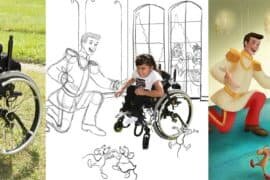It is complicated learning how to deal with a teenager with mild Aspergers Syndrome.
Mild, high functioning autism is a misleading term.
Rarely are the symptoms of an autistic teenager considered as simple, straightforward or easy.
In fact, “invisible disabilities,” such as Asperger’s syndrome or high functioning autism are, arguably, more difficult to cope with since there is no clear sign that there is a disability to begin with.
As our children get older, it is more difficult to manage the symptoms of an autistic teenager than it is a child with high functioning autism.
For one, adults seem to be more accommodating to younger children who need support than they are to teenagers with high functioning autism.
Let’s examine some common symptoms of mild Asperger’s syndrome
Sensory Issues
High functioning autistic teenagers with sensory needs often do not want to use methods that may have worked for them in elementary school because they do not want to stand out.
For instance, fidget toys and other methods of getting the necessary sensory input to remain regulated would be fodder for ridicule in most middle and high schools.
Therefore, the unmet sensory needs of teenagers with aspergers may manifest themselves in undesirable behavior.
This creates a negative cycle of being dealt with punitively for something that is a manifestation of their disability.
Social Cluelessness
Teens with mild, high functioning aspergers often miss out on social clues.
This is especially troublesome starting in middle school where there are so many unwritten rules to the social strata.
Teenagers with aspergers may not be able to interpret sarcasm or realize when others are annoyed with their incessant ramblings about preferred subjects.
Executive Functioning Challenges
If you have a teen with mild aspergers syndrome, then I’m sure you are familiar with their struggles in executive functioning.
Put simply, executive functions are the cognitive skills that control how we initiate, plan and organize, set goals, solve problems, regulate emotions, and monitor behavior.
High functioning autistic teenagers very often struggle to plan effectively, organize, focus, self-start, stay on task, avoid distractions, make good decisions, have a realistic perception of time, persist when wanting to give up, and do several other things in order to execute.
Even if they are the most brilliant student in class, they may be unable to successfully complete assignments and pass tests due to executive functioning challenges.
Anxiety
Another common symptom of mild aspergers in teenagers is anxiety.
For some it is a result of the intense feelings associated with the challenges of sensory regulation.
Others may feel anxious if they sense a loss of control or do not understand the rules.
Unfamiliar environments, unfamiliar people and not knowing the expectations can create anxiety for many teenagers with aspergers.
There are just as many causes for anxiety in teenagers with mild aspergers as they are for anyone else.
Rigidity/Difficulty with Transition
Sometimes, as a result of all of the above, teens with high functioning autism experience difficulty with transitions.
There is often a rigidity and a desire to stick with preferred topics, environments and people.
Aspergers teenagers often experience life in defense mode so they may appear rigid in order to protect themselves from sensory overload or anxiety.
How do we, as parents, deal with a teenager with mild Asperger’s syndrome (or high functioning autism)?
Play to their strengths
Teenagers with mild, high functioning aspergers often have highly preferred activities and interests.
Their ability to hyper-focus on their preferred interests may be used as a bridge to learn and master new skills.
Using their strengths, such as an acute knowledge of certain topics, could help with other, non-preferred subjects.
For instance, an intense interest in trains may open the door to learning how to read using train books.
Remind them that high school is not forever
It may be difficult for your teenager with aspergers to project that there is a future beyond high school.
Teenagers, in general, may lack the ability to know that their current reality will change and that their immediate circumstances are not permanent.
This is important to help your high functioning autistic teenager understand that difficult situations will pass as well as recognize that their actions have future consequences.
Teach them to ask for help
Teenagers with mild, high functioning aspergers need to know when to ask for help.
Often those around them have no idea that they may struggle in certain areas so help may not be automatically offered.
Again, this is one of those complications of “invisible disabilities” – not everyone can comprehend why a teenager may not be able to interpret figurative language, for example.
Learning when and how to ask for the help they need is a skill teenagers with aspergers need to possess.
RELATED: Do you feel isolated as a special needs parent?
Share with them that everybody struggles with something
It may get overwhelming for teenagers with mild, high functioning autism to feel that their struggles are always front and center.
They may feel that they are monitored more than their peers and that they are constantly reminded of what they cannot do.
This is a good time to remind your teen that everybody struggles with something.
Conversely, they also need to be reminded of their strengths and building upon those to help bridge the gap between their struggles.
Teenagers, in general, need to be reminded that they are not alone with their problems.
But teens with aspergers, in particular, may need it pointed out to them that they are not the only ones facing struggles.
Model good hygiene
It may be necessary to directly teach and model good hygiene regularly for your teenager with mild autism.
These skills do not always come naturally and will possibly need to be reinforced.
Whether aspergers teens are simply unaware of poor hygiene or just like the comfort of wearing familiar clothes repetitively without washing them is a mystery.
However, the answer is definitely to explicitly teach, model and reinforce good hygiene.
Encourage patience
Autism is often accompanied by a rigidity and anxiety when things are not a certain way.
Further, teenagers with aspergers may desire control over their surroundings, especially when new and unfamiliar to them.
A perceived loss of control may result in intense emotions and an impatience to get the desired result.
It is important to continually encourage and practice patience with your high functioning autistic teenager.
Teach responsibility
If our teens with aspergers are going to learn to survive in the world, they need to learn to take responsibility for their actions.
It is important to teach them that they are accountable for their thoughts, feelings and actions.
Self-control is an important executive functioning skill for success in academics and life.
Encourage independence
Independence is the ultimate goal for our teenagers with mild aspergers.
Our job all along as parents is to teach them the skills they need to be able to survive, and thrive, on their own.
Each little opportunity for independence along the way will help build their self-confidence to do things on their own.
As soon as our teens with high functioning autism are able to do a task independently, we should encourage that.
It will serve them in the long run.
RELATED: Special needs parents and depression – You are not alone
Keep the lines of communication open
Some teenagers with aspergers are naturally quiet and reserved.
Others may seemingly never stop talking.
Regardless, it is crucial to keep the lines of communication open during the teenage years so that they feel comfortable talking through certain issues.
Mild, high functioning autism does not shield them from the problems of the world such as drugs, alcohol, smoking, or sex.
We need to be sure our teenagers with aspergers feel comfortable talking to us so they can get the facts and advice they need to deal with these issues.
Teach healthy habits and routines
In order to set our teenagers with aspergers on a healthy path for life, it is essential to explicitly teach healthy habits and establish routines for success.
Some autistic teenagers may have very limited or restrictive diets. It is important that they are aware of healthy eating habits and incorporate as many healthy foods as possible into their diet.
If that is a serious issue for your teen, research supplements to be sure they are getting the nutrients they need.
In addition, stress the importance of exercise – both for the brain and the body.
Establishing these healthy habits now will serve them well into adulthood.
Some symptoms of teens with autism may make it difficult to participate in highly competitive team sports or other activities that require sustained cooperation with peers.
However, there are many other activities in which high functioning teens with autism can successfully participate.
Activity Ideas for High Functioning Autistic Teenagers
Autistic Teenager Activities
Scouting
After school clubs
Youth groups at religious places of worship
Volunteer organizations
Karate
Fencing
Swimming
Biking
Bowling
Coding
Archery
Student government
Band
Computer games
Lego clubs
Hiking/Camping
Animal care
Fantasy sports leagues
Manage statistics for sports team
The key is to build on your mild, high functioning autistic teen’s preferred interests to help them branch out.
Many times it’s easier to do activities that are both individualized and part of a larger group.
For instance, hiking, camping and bike riding can be done with others even though it is an individual activity.
There is room to go at your own pace and do it your own way, which is not the case with team sports.
The Number One Mistake When Dealing with a Teenager with Mild Aspergers
While it is difficult to know exactly how to deal with a teenager with mild aspergers, we need to avoid this one thing as their parents:
Doing everything for them
There comes a time, just like in any child’s life, where we need to step back a little as the parents.
When you are parenting a child with special needs, this is complicated.
For their entire life, you have been the one leading the charge to get services, treatments, accommodations, understanding and acceptance.
It is a battle to raise a child with mild, high functioning autism. We walk a fine line between working so hard to help them fit in yet supporting them to ensure that they don’t completely drop out when they end up not being included.
We are so used to being the advocate, the fierce mama bear, the caretaker, the home nurse, the psychologist, the behavior specialist, the communications director and every other role we fulfill as special needs parents that we don’t even know how to step back.
But we need to with our aspergers teenagers. We are doing them a disservice if we do not allow them to start experiencing the real world.
While we want to continue to protect them, we need to let them (productively) struggle so that they can learn and grow.
The number one predictor of success for those with mild aspergers symptoms is whether or not they can handle responsibility and navigate independence.
Living with an aspergers teenager is never boring. Hopefully these tips will help you deal with your teenager with high functioning, mild aspergers with more clarity and hope.
Share some of your best tips for dealing with high functioning autistic teenagers in the comments section below.







11 Comments
Something that we have implemented to try to teach our kids (one age 12 High-Functioning Autistic and the other age 7 ADHD and possibly anxiety) some life skills is our “Summer of Independence”. I went online and found lists of age-appropriate skills and chores, and wrote up lists for each of them. Each day during the summer (we felt it was too hard during the school year and just getting them through school responsibilities), they pick a task from their list to practice that day. They can’t repeat a task until they have completed every item on the list at least once. Things like tying their own shoes, showering independently, making themselves a basic meal. Also life skills and family chores like doing the dishes , folding laundry, making a grocery list and picking out items from the store, etc. there is a fair amount of work on my part to put the schedule together and then to correctly teach them the first time they do a task, but it gives them the chance to learn something necessary for functioning in life, and in a less stressful setting.
I love this! It really is true that it’s such a necessary thing for us to explicitly teach our kids so that they can eventually be independent. Somehow, during the school year, I still end up doing all of the laundry. But I’m bound and determined to permanently pass that one off this summer! I really like your idea of them picking a task from the list and then having them complete all of the items before repeating that task. So clever!
What an absolutely thorough post!!!
I kept thinking “What about…? I need help with..!” and there it would be, further down…
I’m dealing with my son’s transition toward — we hope — college in 2020 (he’s a junior now) and it’s terrifying.
Must. Stop. Doing. Everything!!!!! I am finding that my son does Soooooooo much better if allowed to CHOOSE and direct his own efforts toward independence, so the above parent is way ahead. Great job!
Thanks and love,
Full Spectrum Mama
Oh my word, I know college is not that far off but I still feel like he’s such a little boy some times. Independence is our goal for them, no matter how difficult it is for us to let go. Best of luck to your son!! Hang in there, Mama!
What a great read… I needed that. Don’t do everything for them. I am a mama of 3 boys with HFA 17, 10 and 9 WOW what a journey. My 17yr will be happy with me stepping back. I have to find the courage knowing I taught him well and know he can do it!
It’s not easy! Mine just turned 14 and I still see him as a little kid. But slowly I’m starting to let him be more responsible for his own actions and hoping and praying that he can learn to be accountable without too much struggling.
I’m in the middle of researching and I believe my son and I may both be high functioning Aspies. He is now 20 but I have always raised him to be independent. But his social skills, eye contact, and child like tendencies now make sense. He goes to college and works part time. Has his own vehicle but I have always wondered why he doesn’t go out with friends. I do get scared that he will end up alone. Is there any chance of medical treatment with Asperger Syndrome?
Hi Linda – there are many therapies that can help someone with Asperger Syndrome. I’m not sure there is a medical treatment, per se. But there are so many resources out there for strategies to help with social skills, etc.
This article is 13 yrs of struggles in the best explanation possible. Finally, good to know I am not a bad parent and this does exist! Been through so many doctors who kept dismissing my concerns and struggles, it is real! I will keep this reference to show. Feeling relieved to know we are not alone. There is help for us now. Thank you for this!
This article is 13 yrs of struggles in the best explanation possible. Finally, good to know I am not a bad parent and this does exist! Been through so many doctors who kept dismissing my concerns and struggles, it is real! I will keep this reference to show. Feeling relieved to know we are not alone. There is help for us now. Thank you for this- brought tears to my eyes!
You are certainly not a bad parent! I am glad it resonated with you.